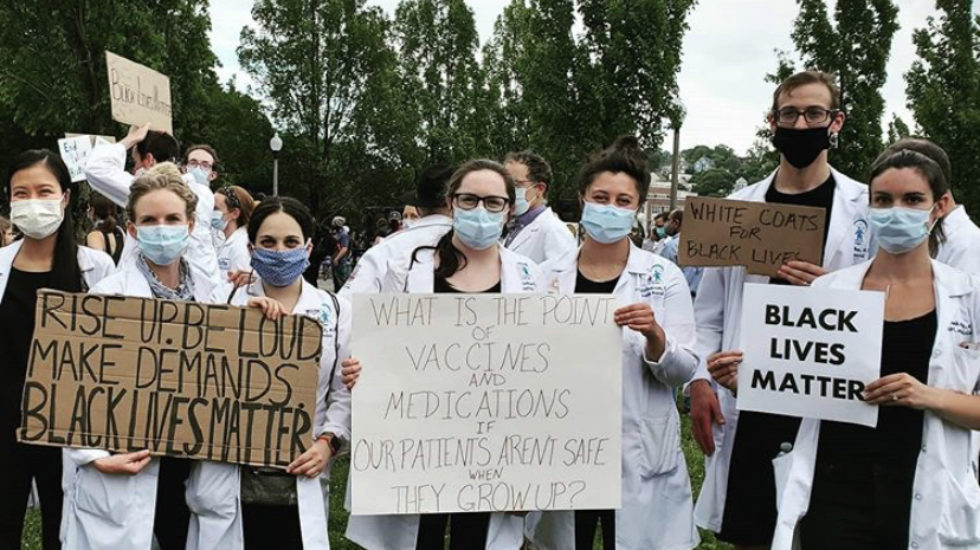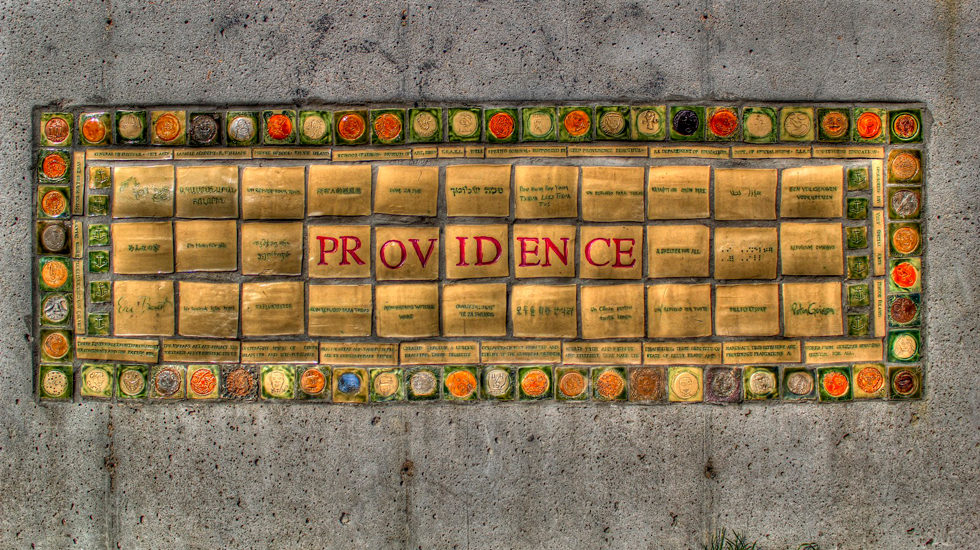Diversity
Dr. Susan Hockfield, the first woman to lead MIT as its president, was a vocal supporter of improving the diversity of the university as well as innovation opportunities and workforce. During her presidency, MIT saw a significant increase in female and minority faculty. Dr. Hockfield noted that:
“Creating a culture of inclusion is not an optional exercise; it is the indispensable precondition that enables us to capitalize on our diverse skills, perspectives and experiences, so that we can better advance the fundamental research and education mission of MIT.”
This truth applies to more than just MIT. At Brown, we feel we are at our best when our faculty, residents and students reflect the breadth of diversity in those whom we serve. Differences in perspective and background enhance our ability to empathize and thereby fulfill our oaths. Settled in 1636 by the Reverend Roger Williams, Providence was founded as a refuge from Puritan intolerance. It has grown into a modern, cosmopolitan hub with outstanding emphasis on the arts, culinary innovation, business, research and education. It retains, however, its legacy of tolerance, inclusion and diversity, in accordance with the spirit of Dr. Hockfield’s comments.
According to a 2015 Survey entitled Most & Least Ethno-Racially Diverse Cities, Providence ranked 16th out of over 300 (meaning 16th most diverse) of the most populated U.S. cities across three key metrics, including racial and ethnic diversity, language diversity and U.S. region of birth diversity. Brown is part of that reality. The Office of College Admission at Brown University reports that the 2019 admitted class is among the most diverse in Brown’s history, with 42 percent students of color, defined as students who self-identify as African American, Latino, Native American or Asian. Additionally, of those admitted, 10 percent represent the first generation in their families to go to college, another record number for the University.
The Internal Medicine Residency Program at Brown, in alliance with our colleagues at the Alpert Medical School and Brown University, strive to promote a diverse and inclusive residency program and faculty, reflecting our community and welcoming diverse backgrounds and opinions. Such diversity indeed makes us stronger.
Bias Reduction Education in Brown Department of Medicine Podcast
Dr. Kate Cahill (Clinician Educator track Co-Director/Brown IM Core Clerkship Director/BRIM Instructor) joins Dr. Tammaro in this Podcast describing the nature and implementation of the BRIM program for faculty and residents here at Brown.
You can access the podcast at http://www.brownmed.org/needle/.
The Brown Minority Housestaff Association (BMHA)
The Brown Minority Housestaff Association (BMHA), in partnership with the Alpert Medical School Office of Diversity and Multicultural Affairs (ODMA), continues to make significant contributions to promote diversity and inclusion. BMHA was founded in 2013 by residents across specialties interested in supporting a diverse GME community and the advancement of underrepresented minorities in medicine through mentorship, networking, and advocacy. Since then, BMHA has emerged as a leading interdepartmental body to help address disparity, health equity, racism, and diversity in medicine. The organization aspires to provide a welcoming and inclusive atmosphere for all residents and hopes to create close-knit, lifelong friendships as its members support one another throughout residency.
In addition to holding routine meetings, BMHA sends representatives to various regional and national conferences to promote recruitment and representation amongst residents in graduate medical education. It continues to serve as host for the annual Second Look Weekend for prospective residents applying to Brown and the MED Talks lunch series (Medical Education through Diversity Talks).
In 2020, BMHA organized our White Coats for Black Lives march from Rhode Island Hospital to the Rhode Island Statehouse, pictured below.

In 2022, Eman Asiedu, MD and Jessica Gonzalez, MD serve as our program representatives to the BMHA. During the current interview season, interviews will be conducted remotely, and campus visits will be virtual. If you are interested in speaking with any BMHA representatives during your interview virtual visit to Brown, please let us know and we will gladly arrange an introduction. Learn more about BMHA by visiting the website: http://www.brownminorityhousestaffassociation.com.
Brown Advocates for Social Change and Equity (BASCE)
Brown Advocates for Social Change and Equity (BASCE) is a Fellowship offered through the Office of Diversity and Multicultural Affairs (ODMA) at the medical school. BASCE Fellows are selected to participate in a yearlong program aimed at developing healthcare leaders who will be leaders in engaging peers in dialogue around issues of racism, cultural diversity, inclusion, social justice and health equity. The program, open to medical students, residents, fellows, attendings, and allied health professionals, encourages vertical and horizontal mentorship and learning in a non-hierarchical manner with current and past BASCE cohorts. Founded in 2017, BASCE encourages deepening of anti-racism work through foundational understandings of theories including Critical Race Theory, Public Health Critical Race Praxis, Camara Jones’ three levels of racism, DisCrit, and Critical Whiteness Studies. BASCE Fellows are trained to facilitate sessions and engage in critical anti-racism and anti-oppression work within their institution. Fellows are provided access to up to $500 to develop and carry out a leadership project. Drs. Beth Gentilesco, Kyla Dewar and Gerry Ovide are the Department of Medicine’s two most recent graduates of this fellowship. For more information please email odma@brown.edu.
Brown Sexual and Gender Minority Alliance (BSGMA)
 Brown Sexual and Gender Minority Alliance (BSGMA) is an organization devoted to education, advocacy, and support for sexual and gender minority trainees and faculty affiliated with the Warren Alpert Medical School of Brown University. Membership is open to any and all trainees, faculty, and students regardless of identity or orientation. The 2022 program representative to the SGMA is James Sharfen, MD.
Brown Sexual and Gender Minority Alliance (BSGMA) is an organization devoted to education, advocacy, and support for sexual and gender minority trainees and faculty affiliated with the Warren Alpert Medical School of Brown University. Membership is open to any and all trainees, faculty, and students regardless of identity or orientation. The 2022 program representative to the SGMA is James Sharfen, MD.
For more information please see:
Email: brownsgma@gmail.com
Facebook: facebook.com/brownSGMA
Instagram: @brownsgma
Office of Diversity and Multicultural Affairs (ODMA)
The Warren Alpert Medical School’s Office of Diversity and Multicultural Affairs (ODMA) provides support for diversity in residency programs affiliated with Brown University. Dr. Pat Poitevien, MD serves as the Senior Associate Dean for Diversity and has been instrumental in providing training and educational programs to residents and faculty. The BASCE fellowship, BMHA and Med Talks are all co-sponsored by ODMA.
Code Black – Health Equity for Black Lives

Code Black RI was founded by a group of medical students, housestaff, and faculty dedicated to taking action towards equity for Black lives. This means health equity for our Black patients, but also equity in the healthcare workplace. This is a multi-organizational and institutional effort represented by, but not limited to, the organizations listed below.
- Brown Minority Housestaff Association (BMHA)
- Brown Sexual Gender & Minority Alliance (BSGMA)
- Student National Medical Association (SNMA)
- Latinx Medical Student Association (LMSA)
- Asian and Pacific American Medical Student Association (APAMSA)
- Spectrum (LGBTQ+ medical students)
- Office of Diversity and Multicultural Affairs (ODMA) at the Warren Alpert Medical School
- Office of Women in Medicine and Science (OWIMS)
For more info and updates visit: www.codeblackri.com
MED Talks – Medical Education through Diversity
The best way to learn how to take care of a community of people is to ask the members of that community to share their experiences. Medical Education through Diversity (MED) Talks is a speaker series that was started in 2015 and created to form a dialogue between patients and the medical community that cares for them. Each quarter, panels of individuals who represent a patient population that we care for here at Brown come to speak to an audience of physicians, nurses and students to talk about ways in which healthcare can provide more culturally competent care to their community. We have partnered with patients from the Jehovah’s Witness, transgender, refugee, deaf and foster family communities to bring this unique educational opportunity to our hospital. Patients will often share stories of their own interactions with healthcare professionals and highlight ways that their care could have been improved. Audience members are encouraged to ask difficult questions to better understand a better way to provide care to these populations. This project has previously been recognized and supported by the Gold Foundation. Funding has been graciously provided by BMHA and ODMA.
Diversity Visiting Scholars Visiting Medical Student Scholarship
The Brown Internal Medicine, Med-Peds, and Pediatrics Residency programs, together with the Office of Diversity and Multicultural Affairs (ODMA) are proud to sponsor the Diversity Visiting Student Scholarship. Every year, qualified underrepresented minority (URM) students are selected from a competitive applicant pool to receive this scholarship to do an away rotation with the Brown University. Students will be paired with resident and faculty members of the Brown Minority Housestaff Association (BMHA) for mentorship. As a visiting student, you can choose from a variety of visiting electives at Brown. We strongly encourage students interested in this scholarship to apply for away rotations early. All rotations will be arranged through the medical school and the scholarship will be administered through ODMA. Questions about this scholarship should be directed to diversity-visiting-scholarship@brown.edu
Other Department of Medicine Diversity & Inclusion Initiatives
- Department of Medicine Diversity, Equity, and Inclusion Committee. The 2020-2021 academic year marked the inauguration of the DEI Committee in the Department of Medicine. Chaired by Dr. Beth Gentilesco (who recently completed a BASCE fellowship – see above), membership includes faculty and residents from throughout the Department of Medicine. This committee works on expansion of the department’s efforts in diversity recruitment and retention, anti-bias and anti-racism curricula and education, creating an inclusive working environment, and ongoing monitoring efforts.
- BRIM (Bias Reduction in Internal Medicine). Brown is one of 20 Departments of Medicine in the United States participating in this educational faculty development study to address identification and reduction of implicit bias. Dr. Dominick Tammaro serves as the local lead faculty member for this project, which is based at University of Wisconsin and which recently concluded its third and final year. Twelve Internal Medicine faculty members have been trained as workshop presenters and will be rolling out the same curriculum to all Internal Medicine housestaff beginning November 2020.





